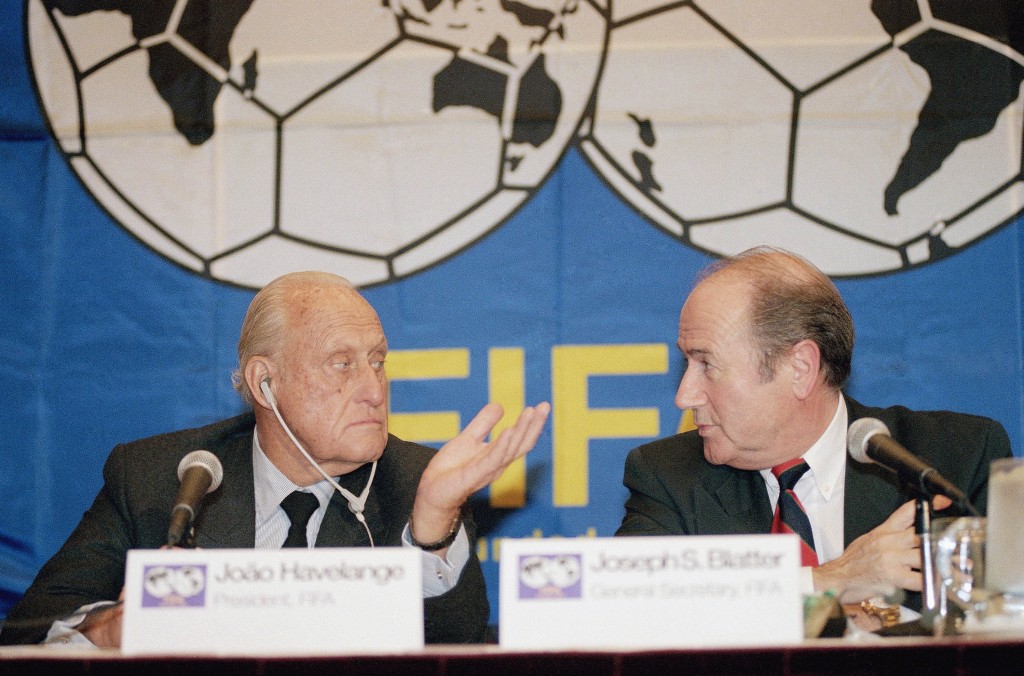Blatter’s predecessor left soccer’s governing body under a cloud of corruption — as does he

In this 1994 photograph, João Havelange, left, then-president of FIFA, and Sepp Blatter, then-general secretary, confer during a press conference in New York. Havelange ran soccer’s governing body for 24 years, before Blatter took over the leadership.
A sharp intake of breath and a subsequent communal sigh of relief were the order of the day yesterday when, at around 2pm local time, Joseph “Sepp” Blatter stunned the sporting world and announced he would resign as the head of FIFA — a dramatic turnaround that came just days after the 79-year-old Swiss president had been re-elected.
“I have been reflecting deeply about my presidency and about the 40 years in which my life has been inextricably bound to FIFA and the great sport of football,” he said in Zurich, addressing barely a handful of journalists, illustrating how unprepared the media was for the bombshell announcement.
“I cherish FIFA more than anything and I want to do only what is best for FIFA and for football,” he added.
A few sentences later, Blatter (for once) had finally done what’s best for FIFA: he resigned, announcing it was time for a “profound overhaul” at soccer’s shady organization of servile sycophants.
As the 79-year-old (who’s been at FIFA for four decades, 17 of those at the top of the tree) told the world with a straight face that he’d been pushing for “term limits” for the presidency and for membership of the executive committee, he complained of his reform efforts being blocked.
Blatter, of course, has been at the helm of FIFA longer than Bashar al-Assad has lead Syria. When he assumed the throne in Zurich, Lionel Messi was only 10-years-old.
The Apprentice becomes the master
Blatter’s time at FIFA traces all the way back to his mentor, the man that brought him into the organization, João Havelange. A former watch industry CEO, Blatter worked at the Swiss Ice Hockey Federation before moving to FIFA, where he came under the Brazilian’s wing.
In his 24 years in charge, Havelange revolutionized FIFA, expanding the World Cup and turning the sport into a big-money enterprise with big-money sponsors on big-money commercial contracts. Havelange aggressively won over the heads of its member federations from smaller countries, ensuring their support in crucial votes and thus ensuring his control at the top would continue unbroken — a tactic copied by Blatter, who has had strong support in Africa and Central America, in his 17 years at the top.
Havelange also departed the organization under a cloud, like Blatter does. Havelange and his former son-in-law, Ricardo Teixeria (a former head of the Brazilian soccer association, who it was revealed yesterday is under invesigation for alleged money-laundering and tax evasion), were accused of taking millions in bribes from sponsorship deals. Blatter too was accused of being involved in one dodgy bank transfer at the time, but was cleared.
The allegations didn’t stop there. In 1998, allegations of bribery marred Blatter’s election win over then-UEFA president Lennart Johansson. In 1999, a Dutch newspaper claimed Havelange accepted diamonds, paintings and bicycles in connection with the awarding of the 1992 Summer Olympics.
Havelange and Blatter in total tallied up 41 years between them — but the end of that era is nigh.
Blatter, of course, has been at the helm of FIFA longer than Bashar al-Assad has lead Syria. When he assumed the throne in Zurich, Lionel Messi was only 10-years-old.
Break from the past?
The most pressing question now is who will replace Sepp at the helm of the world’s most popular sport?
Will FIFA choose a new president who has history with Blatter? Someone who ‘knows where the bodies are buried’? Or will the federations choose to break with the past? Even appoint someone from outside the sport altogether?
One of the original favourites to succeed Blatter was his close ally, Secretary General Jérôme Valcke, but the revelations and fallout over a US$10-million “bribe” from South Africa to an account linked to Jack Warner has left his reputation in tatters. The reaction to the allegation was farcical, with FIFA instantly denying Valcke knew anything about the deal. Just an hour later, the Press Association issued a copy of a letter about the payment. It was addressed directly to Valcke.
That leaves the two frontrunners — UEFA’s Michel Platini and Prince Ali bin Hussein, who ran against Blatter last time. He, of course, won enough votes last time out to push Blatter into a second ballot. Ali said yesterday he was “at the disposal of our national associations,” indicating he would run again.
Meanwhile, Platini, who didn’t run against Blatter, said the 79-year-old’s choice to step down was “a difficult decision, a brave decision, and the right decision.” But his reputation has been sullied by his strong support for Qatar’s bid to host the World Cup and his links to the Middle East country’s establishment. Platini and former French president Nicolas Sarkozy lunched with members of the Qatari royal family before Paris St Germain was sold and Platini’s son is the chief executive of a Qatar-owned sports company.
Other ex-footballers, such as Luis Figo or David Ginola have flirted with a run for the post, but it seems unlikely that either of them would win enough backing for the top post. Ginola’s initial exploration was funded by a betting company, while Figo — who likened Blatter’s tenure to a dictatorship — was seen over the last few months as a stalking horse, rather than a serious candidate. He pulled out eight days before the vote, to rally support behind Prince Ali.
Other outsiders who could become challengers include Dutchman Michael van Praag, President of African Football Confederation Issa Hayatou and France’s Jérôme Champagne. The latter two are seen as supporters of Blatter, who would offer much of the same.
Blatter, it seems from his resignation speech yesterday, still feels he has a role to play. But in truth, his role in FIFA’s future will not be decided by him. Many quickly suggested in the immediate aftermath that investigators must have “something on him” for events to have come this far, and last night, The New York Times reported that the Swiss executive was the “focus” of a US federal corruption investigation.
According to the US newspaper, “several United States officials, speaking on the condition of anonymity,” briefed that they were hoping to flip some of the indicted FIFA executives in the coming days in order to dig up dirt on Blatter. Clearly, they are convinced the evidence trail will eventually envelop him. In the near future, the former watch company executive may find time has ran out.
FIFA must allow the truth of what happened to come out. The organization could go a long away toward increasing transparency by releasing the full, unredacted version of the Garcia report
The other option, which may be seen favourably considering how long the corruption scandal may take to resolve, is to look outside the sport for a new president. One name mentioned strongly in the British press yesterday was Lord Seb Coe, the former athlete whose organization of the London 2012 Olympics was widely praised.
Hot potatoes
As well as the “profound overhaul” FIFA needs (Blatter’s own words), there are two huge hot potatoes that loom largely over the new president’s desk.
The first is the murky circumstances surrounding the awarding of the hosting of two World Cups to Russia (2018) and Qatar (2022).
FIFA must allow the truth of what happened to come out. The organization could go a long away toward increasing transparency by releasing the full, unredacted version of the Garcia report, an investigation by US attorney Michael J. Garcia into allegations of corruption surrounding the decision to decide on the host countries. FIFA blocked the document’s full publication, releasing only a “legally appropriate version” of the ethics investigator’s findings.
The second pressing issue is whether FIFA’s executives will hold a re-vote on the awarding of the tournaments, especially if, ahem, foul play was uncovered during the decision-making process. While it seems unlikely that either Russia or Qatar will lose their right to host the tournament (especially with preparations already under way), a fresh vote — depending on the result — could be a victory for transparency and fair play.
FIFA now finds itself at a crossroads. Every day, as more and more newspapers file copy about its officials and the allegations widen toinvolve more of them, it becomes clearer that a changing of the guard is necessary. While Blatter receives credit for bringing Africa its first World Cup and for funding key projects in less-developed countries, he had years to clean up FIFA’s governance, despite his claims of reform.
For years now, the majority of the soccer world has been unhappy with FIFA’s direction, apparent nepotism, priorities and lack of transparency. Now, soccer’s governing body has a chance to forge a new path.
@urlgoeshere
Originally published in the Buenos Aires Herald, on Wednesday, June 3, 2015.
